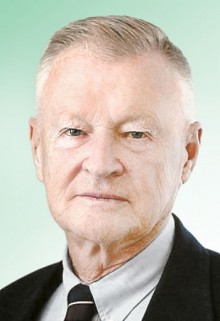Come what may, the events in Ukraine are historically irreversible and geopolitically transformatory. Sooner rather than later, Ukraine will be truly a part of democratic Europe (http://www.ft.com/intl/cms/s/0/78d 02720-60e8-11e3-916e-00144feabdc0.html); later rather than sooner, Russia will follow unless it self-isolates itself and becomes a semi-stagnant imperialistic relic.
The spontaneous outburst of distinctive Ukrainian patriotism – sparked by the mendacity of its corrupt and self-enriching leadership ready to seek Moscow’s protection – signals that commitment to national independence is becoming the dominant political reality. This is especially the case among the younger Ukrainians who no longer feel that they are linguistically or historically just a slightly deviant part of “Mother Russia.”
Yes, linguistic divisions persist and some parts of Ukraine still feel closer to Russia. But it is striking that even some of the most outspoken espousers of a European vocation have only recently embraced the Ukrainian language as their own. Two decades of independence, of growing pride (http://www.ft.com /intl/cms/s/0/dbee9e22-6052-11e3-b360-00144 feabdc0.html) in rediscovering Ukrainian history, and of observing the country’s western neighbors economically benefiting from their European connections is creating a new mindset. That mindset is not embracing anti-Russianism but it is asserting Ukraine’s own historic identity as culturally an authentic part of a larger Europe.
That is why, one way or another, Ukraine will unavoidably come closer to Europe. It is striking that even in neighboring Belarus, ruled by the authoritarian Lukashenka regime, a similar western orientation is beginning to surface. Neither countries are motivated by hostility towards Russia, but each senses that their independence as well as their cultural identity increasingly point in a westward direction.
In the next months some sort of a deal between the EU and Ukraine can still be contrived. To facilitate it, the EU must be more receptive to Kyiv’s need for economic and financial support. Ukrainians have to realize that European taxpayers are not enchanted by the prospect of paying for the misdeeds and corruption of the current Kyiv elite. Belt-tightening will be the necessary precondition for an agreement as well as a test of Ukraine’s resolve in asserting its European aspirations. Kyiv will also need to show that the outcome of elections is not determined by the imprisonment of political rivals.
The impact of this on Russia will be felt over the longer run. Moscow’s current geopolitical goal, shaped by President Vladimir Putin’s nostalgic obsession with the country’s imperial past, is to recreate in a new guise something akin to the old Russian empire or the more recent Soviet “union.”
Mr. Putin seems to harbor the naive notion that the leaders of the post-Soviet states will genuinely accept a subordinate role in a Kremlin-led entity. Some of the leaders do pay occasional lip service to that formula – but out of necessity, not conviction. All prefer independence: it is more pleasant to be presidents, prime ministers, generals, ambassadors, and economic moneymakers at home rather than to be the provincial equivalents thereof in a larger Russian empire. The historically proven fact is that national statehood, once attained, is infectious and almost impossible to undo except through massive external force.
Today’s Russia is in no position to assert a violent restoration of its old empire. It is too weak, too backward, and too poor. Its demographic crisis makes matters worse. The fact that the newly independent Central Asian states favor increasingly comprehensive arrangements with China is another concern for Russia, reawakening long lingering territorial nightmares.
It is only a question of time before it becomes evident to Russia’s social elites that Mr. Putin’s heavy-handed efforts have very limited prospects of success. Sooner or later, he will no longer be president. And not long thereafter Russia – and especially its emerging new middle class – will conclude that the only path that makes sense is to become also a truly modern, democratic, and maybe even a leading European state.
The author was national security adviser to US president Jimmy Carter and wrote Strategic Vision: America and the Crisis of Global Power







